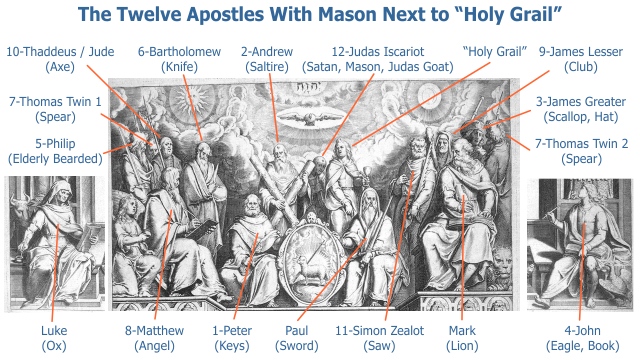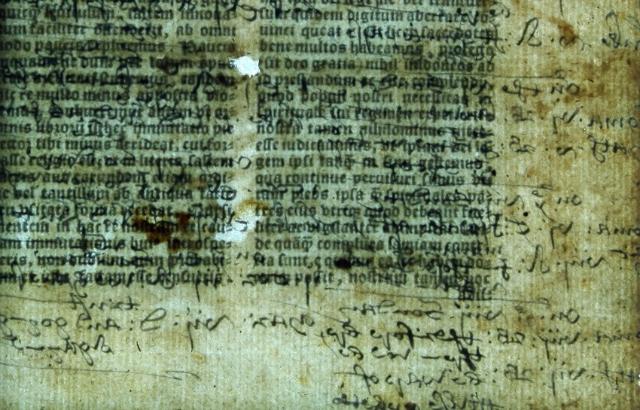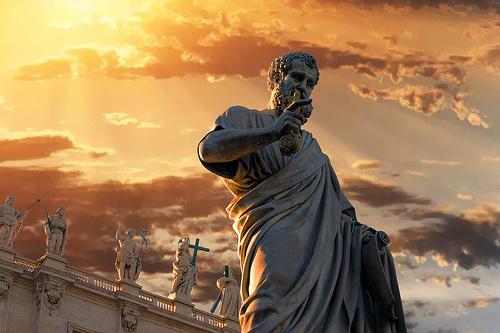There is a long-standing misconception that the religion we call “Christianity” is devoid of the teachings of Gnosis. An ancient Greek word that simply means “to know or knowledge.”
The facts are that if we were to take a serious look with an open mind (without dogma and sinful Christian Judgment) at the ancient Scripture of the New Testament that was written in Greek and also the modern English versions, we would clearly witness the teachings of Gnosis.
For example, the English words know, to know, knowledge, understand and perceive are found hundreds of time in the English version of the Bible. Words that all connect to the much older Greek word, Gnosis.
The Greek words found in the New Testament that are often translated in English as “know” and “to see” are “eido, eida, eidos, oida, ida, ginosko, epiginosko, epistamai, gnosis and epignosis.” These words have the same semantic range and general meaning as the Greek words “ginosko and eido” are translated as, “to observe or to come to know through observation – to perceive and understand.”
Strong’s Number G1492 matches the Greek εἴδω eídō, i’-do, which occurs 691 times in 625 verses in the Greek concordance of the KJV. Many of these verses connect directly to the Jewish King and Messiah to the Christians, Jesus.
The Greek Concordance gives the following definition:
1492 eídō (oida) – properly, to see with physical eyes (cf. Ro 1:11), as it naturally bridges to the metaphorical sense: perceiving (“mentally seeing”). This is akin to the expressions: “I see what You mean”; “I see what you are saying.”
1492 /eídō (“seeing that becomes knowing”) then is a gateway to grasp spiritual truth (reality) from a physical plane. 1492 (eídō) then is physical seeing (sight) which should be the constant bridge to mental and spiritual seeing (comprehension).
We also find the word eido to be popular with some of the world’s greatest philosophers.
In Plato’s philosophy, he calls the more real world, the world of eidos (idea in English) which is the Matrix or material reality constructed by man through ‘Forms’ or ‘Ideas’.
Oida (to know) is another common Greek work you will find in relation to eido (to see). It is common sense that in order to oida (to know), you must eido (to see) first.
Thayer’s Greek Lexicon lists ̓́eidō with the following definition:
1) to see
1a) to perceive with the eyes
1b) to perceive by any of the senses
1c) to perceive, notice, discern, discover
1d) to see
1d1) i.e. to turn the eyes, the mind, the attention to anything
1d2) to pay attention, observe
1d3) to see about something
1d3a) i.e. to ascertain what must be done about it
1d4) to inspect, examine
1d5) to look at, behold
1e) to experience any state or condition
1f) to see, i.e. have an interview with, to visit
2) to know
2a) to know of anything
2b) to know, i.e. get knowledge of, understand, perceive
2b1) of any fact
2b2) the force and meaning of something which has definite meaning
2b3) to know how, to be skilled in
2c) to have regard for one, cherish, pay attention to (I Thessalonians 5:12)
These ancient Greek words have the same meaning and approximately the same semantic range in the Greek Scripture as they do in the Hebrew and English versions of the Scripture. In fact, the Greek Eido †εἴδω eídō, (pronounced i’-do) is a primary verb that can be found 666 times in the Greek Lexicon (KJV). I will delve more into the 666 Gnostic subject in a future article.
The Apostle John loves to use the word. He uses it over 100 times like in one of his most famous passages found in John 3:11 – Verily, verily, I say unto thee, We speak that we do know, and testify that we have seen; and ye receive not our witness.
In Greek, the true transcription reads; “Amēn ἀμὴν (truly) Amēn ἀμὴν (truly) legō λέγω (I say) soi σοι (to you) hoti ὅτι (that) ho ὃ (that which) oidamen οἴδαμεν (we know) laloumen λαλοῦμεν (we speak) kai καὶ (and) ho ὃ (that which) heōrakamen ἑωράκαμεν (we have seen).
Eido can be connected to the Hebrew “’iddo”, meaning “his witness, I will praise him”. Iddo or Eido was a minor biblical prophet, who appears to have lived during the reigns of King Solomon and his heirs, Rehoboam and Abijah, in the Kingdom of Judah.
As in Acts 1:8 – But you will receive power when the Holy Spirit has come upon you; and you shall be My witnesses both in Jerusalem, and in all Judea and Samaria, and even to the remotest
Lest we not forget that Jesus was a Judean from the Tribe of Judah. The first century Roman-Jewish historian Josephus calls them the Idumean of Mount Ida. A tribe who in ancient times would have been known as the Idumeans (Eido-means) who occupied Idumea (Eido-mea Greek: Ἰδουμαία, Idoumaía; Latin: Idūmaea).
Jesus was a man who would “know” the law of God. A man who would observe and understand his people and then by doing so, he taught his followers “knowledge” AKA in Greek as Gnosis so that they could gain the wisdom to be saved via eido AKA I-do!
To our ancient ancestors, “to see” was also “to know” (eido, eida, oida) and to truly know, one must not just see with his eyes, he must experience that which he sees.
This “true knowledge” is not knowledge of a fact, but knowledge by experience (true Gnosis) which leads to understanding.
As Luke said of Jesus in 24:45 – “Then He opened their minds to understand the Scriptures,” and Job 12:13 – “With Him are wisdom and might; To Him belong counsel and understanding.”
Gnostic Warrior Conclusion
It is amazing to me that by simply reading the Scripture in both English and Greek, you will come to find that the teachings of Gnosis are not only found all throughout your favorite Bible, they are the central teachings of Christianity.
It makes me wonder about all the Christian writers, priests, pastors and layman who write blasphemous articles about the Gnostics and the subject of Gnosis.
We must ask them, “Do you even understand the words you read and the religion you profess?”
Maybe you should read, study and I say with emphasis “understand” your bible before you commit the sin our Brother Matthew states in 7:3 when he says, “Why do you look at the speck that is in your brother’s eye, but do not notice the log that is in your own eye?
Also, as my ancestor Saint Luke had said in 6:37 – “Do not judge, and you will not be judged. Do not condemn, and you will not be condemned. Forgive, and you will be forgiven.”

Moe is the founder of GnosticWarrior.com. He is a father, husband, author, martial arts black belt, and an expert in Gnosticism, the occult, and esotericism.







